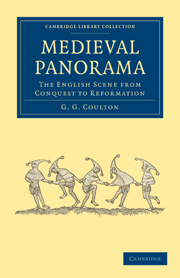Book contents
- Frontmatter
- Contents
- Illustrations
- Preface
- Introduction
- Chapter 1 The Cauldron of God's Wrath
- Chapter 2 Bishops of Rome
- Chapter 3 Conversion of the Wild Men
- Chapter 4 Feudalism emerges
- Chapter 5 Land and Folk
- Chapter 6 The Village (1)
- Chapter 7 The Village (2)
- Chapter 8 Village Dance and Song
- Chapter 9 Nature and Superstition
- Chapter 10 Popes and Prelates
- Chapter 11 Rector and Vicar
- Chapter 12 The Making of a Priest
- Chapter 13 Church statistics
- Chapter 14 The Shepherd
- Chapter 15 The Flock (1)
- Chapter 16 The Flock (2)
- Chapter 17 The Silver Lining
- Chapter 18 Dante's Commedia
- Chapter 19 The Royal Court
- Chapter 20 Chivalry
- Chapter 21 Chaucer and Malory
- Chapter 22 The Monastery
- Chapter 23 Cloister Life
- Chapter 24 The Town
- Chapter 25 Home Life
- Chapter 26 Trade and Travel
- Chapter 27 Just Price and Usury
- Chapter 28 The Ghetto (1)
- Chapter 29 The Ghetto (2)
- Chapter 30 Justice and Police
- Chapter 31 From School to University
- Chapter 32 Scholastics and Bible
- Chapter 33 Science
- Chapter 34 Medicine
- Chapter 35 Freethought and Inquisition
- Chapter 36 The Papal Schism
- Chapter 37 The Lollards
- Chapter 38 The Black Death
- Chapter 39 The Hundred Years' War
- Chapter 40 The Mystics
- Chapter 41 The Peasant Saint
- Chapter 42 Artist Life
- Chapter 43 Literary Life
- Chapter 44 Sports and Theatre
- Chapter 45 Women's Life
- Chapter 46 Marriage and Divorce
- Chapter 47 The Old and the New
- Chapter 48 More and Utopia
- Chapter 49 The Fight for the Bible
- Chapter 50 The Open Bible
- Chapter 51 Peasant and Highbrow
- Chapter 52 The Bursting of the Dykes
- Notes
- Index
- Plate section
Chapter 8 - Village Dance and Song
Published online by Cambridge University Press: 05 July 2011
- Frontmatter
- Contents
- Illustrations
- Preface
- Introduction
- Chapter 1 The Cauldron of God's Wrath
- Chapter 2 Bishops of Rome
- Chapter 3 Conversion of the Wild Men
- Chapter 4 Feudalism emerges
- Chapter 5 Land and Folk
- Chapter 6 The Village (1)
- Chapter 7 The Village (2)
- Chapter 8 Village Dance and Song
- Chapter 9 Nature and Superstition
- Chapter 10 Popes and Prelates
- Chapter 11 Rector and Vicar
- Chapter 12 The Making of a Priest
- Chapter 13 Church statistics
- Chapter 14 The Shepherd
- Chapter 15 The Flock (1)
- Chapter 16 The Flock (2)
- Chapter 17 The Silver Lining
- Chapter 18 Dante's Commedia
- Chapter 19 The Royal Court
- Chapter 20 Chivalry
- Chapter 21 Chaucer and Malory
- Chapter 22 The Monastery
- Chapter 23 Cloister Life
- Chapter 24 The Town
- Chapter 25 Home Life
- Chapter 26 Trade and Travel
- Chapter 27 Just Price and Usury
- Chapter 28 The Ghetto (1)
- Chapter 29 The Ghetto (2)
- Chapter 30 Justice and Police
- Chapter 31 From School to University
- Chapter 32 Scholastics and Bible
- Chapter 33 Science
- Chapter 34 Medicine
- Chapter 35 Freethought and Inquisition
- Chapter 36 The Papal Schism
- Chapter 37 The Lollards
- Chapter 38 The Black Death
- Chapter 39 The Hundred Years' War
- Chapter 40 The Mystics
- Chapter 41 The Peasant Saint
- Chapter 42 Artist Life
- Chapter 43 Literary Life
- Chapter 44 Sports and Theatre
- Chapter 45 Women's Life
- Chapter 46 Marriage and Divorce
- Chapter 47 The Old and the New
- Chapter 48 More and Utopia
- Chapter 49 The Fight for the Bible
- Chapter 50 The Open Bible
- Chapter 51 Peasant and Highbrow
- Chapter 52 The Bursting of the Dykes
- Notes
- Index
- Plate section
Summary
The depopulation emphasized in my preceding chapter was, of course, often due to infectious diseases; but war and famine were possibly even more operative on the whole, when we reckon not only national conflicts, but civil war between province and province, town and town, village and village. Famine was not only a frequent concomitant of plague, but sometimes, apparently, its actual begetter by reducing the frame to defenceless exhaustion: “Fames and mortalitas, for the medieval annalist, are almost inseparable conceptions.” And, happy as the more well-to-do medieval peasant might be in the possession of his own little holding, the majority lived always on the edge of an abyss into which a single bad harvest might, and a succession must, precipitate them. Even in England, where frosts are never so terrible as on the Continent, the primitive plough never scratched deep enough to protect the grain from any very exceptional winter. Nothing in our own annals equals the Belgian winters recorded in the twelfth century, twelve years of bad weather in one case and thirteen in another: but there was a terrible succession of crop failures with us in the early fourteenth century. The Liége chronicler notes minutely the weather from 1195 to 1198: it is a heart-rending story. More than once, at different times, corn went up to ten times its normal price. In England, apart from the frequent formal records of famine in the annals, we sometimes get sidelights which are still more significant.
- Type
- Chapter
- Information
- Medieval PanoramaThe English Scene from Conquest to Reformation, pp. 92 - 102Publisher: Cambridge University PressPrint publication year: 2010First published in: 1938



